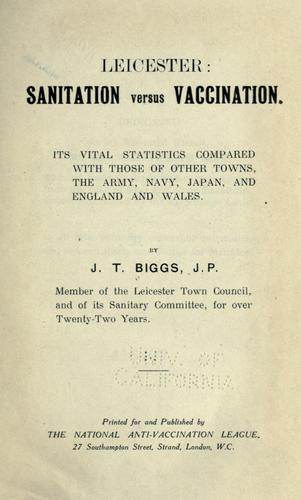So that they may have life steering group member, Caroline Wessel, draws parallels between the COVID-19 pandemic and Smallpox in 19th century Leicester.
We continue to struggle with the anxieties of Covid, but the recent start of Covid vaccinations has now given us hope. So it might be of interest to learn how Leicestershire people dealt with a “pandemic” in the nineteenth century and how one doctor used shock tactics to convince the population.

Many people in the town of Leicester, who traditionally held Liberal and Radical views, were particularly strong in their objection to compulsory vaccination against Smallpox, although one of the most contagious, deadly and disfiguring diseases of that time. The Leicester Anti-Vaccination League (AVL) was founded in 1869, with prominent citizen Mr J.T. Biggs as its Secretary. However an Act of 1871 Act enforced even more stringent punishment on those who refused vaccination for their children. In Leicester many parents flouted the Act and the number of prosecutions there rose from 2 in 1869 to 1,154 in 1881. They included 61 imprisonments, as in many cases parents deliberately chose gaol, rather than a fine, as a means of protest.
However the Leicester Corporation Act of 1879 permitted an alternative measure to vaccination and this soon became known nationally as ‘The Leicester Method’. It involved six principles –
(i) prompt notification of the disease
(ii) isolation and segregation of cases in hospital
(iii) quarantine of those who had been in contact with the patient
(iv) vigilant supervision of all contacts during the incubation period of 14 days
(v) cleansing and disinfection of clothes, bedding etc
(vi) burning of clothes, when necessary.
Does this all sound rather familiar to us in late 2020? We have seen it happening all around us, and read in the newspaper that some of the rules are being slightly or at times flagrantly disobeyed. However there was a good deal of evidence in the 1880s that ‘The Leicester Method’ was often successful, so we need to convince people of this now in 2020.
In 1885 a massive popular demonstration in Leicester attracted delegates from over fifty other nationwide Anti-Vaccination Leagues. They demonstrated by marching with flags and banners and were then addressed by various speakers who developed the theme of the futility and injustice of vaccination. One of those who addressed the crowd maintained that “the system of vaccination was a mere delusion – a baseless superstition; that it afforded no protection from smallpox”. Several councillors realized the Anti-Vaccinators could make them lose their seats, so “moderated their language” and said they would support the repeal of the Compulsory Vaccination Acts. Because of the strenuous efforts of Leicester’s AVL it forced the government to look anew at the issue. Although the law abolishing compulsion was only dropped after the National Health Service Act of 1948 the strenuous opposition from Leicester did in 1889 secure an amendment in the law.
We have a lot of photographs in our collection, but this is perhaps the most iconic. Both boys were exposed to smallpox, but only the boy on the right had previously been vaccinated. The photograph, taken by a doctor working in Leicester, was first published in 1901 #PhotoMW pic.twitter.com/BrYFRLtnBG
— Dr Jenner’s House (@DrJennersHouse) May 18, 2019
Dr Allen Warner came to Leicester in 1901 as Resident Medical Officer of Leicester Isolation Hospital, and witnessed many Smallpox cases of those who had not been vaccinated. He believed that he must show the alternatives of pro-and con-vaccination to the general public, so published a series of shocking photographs demonstrating this. He became Assistant Medical Officer of Health for the Borough of Leicester, Medical Officer for Leicester Education Committee, Medical Officer for the Mental Defectives Committee and was a Public Vaccinator.
In early 2021 we shall eagerly await our own Covid vaccinations, but I am sure you will agree that meanwhile we should continue to embrace “The Leicester Method” to save the lives of others and spare the NHS.